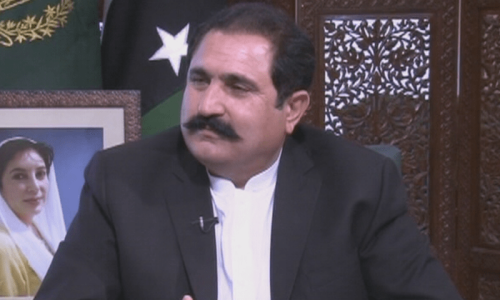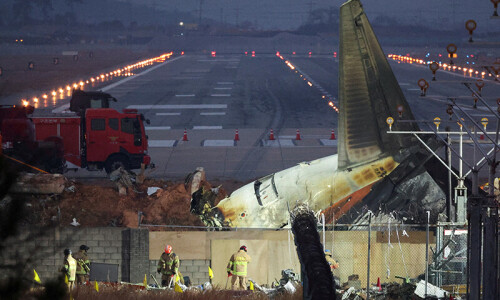
• Shtayyeh says West giving Israel ‘licence to kill’ Palestinians
• Two more Israeli prisoners released
• Fuel-starved Palestinians struggle to contact outside world
GAZA: On a day when Israel’s army reported strikes on at least 320 targets within 24 hours, Gaza’s health ministry said on Monday that at least 436 people had been killed in bombardments over the past 24 hours, while the overall death toll had climbed above 5,000.
In addition, about a dozen trucks carrying desperately needed aid — the third convoy in three days — arrived inside Gaza from Egypt on Monday through Rafah, even as PM Mohammed Shtayyeh accused Western nations of giving Israel a “licence to kill”.
“What we hear from the mouth of the occupation (Israeli) leaders on preparations for a land invasion means more crimes, atrocities and forced displacement,” Shtayyeh told the start of a Palestinian Authority government meeting.
“We condemn the statements that constitute a licence to kill and give Israel political cover to commit massacres and spread destruction in Gaza,” he added.
On Monday, Hamas also announced the release of two more elderly women prisoners in response to Egyptian-Qatari mediation efforts.
A spokesman for the group said in a statement: “We decided to release them for humanitarian and poor health grounds.” An American mother and daughter, Judith and Natalie Raanan, were earlier released on Friday.
Struggle to contact outside world

“Hello from Gaza — I’m still alive’’, it’s a message many Palestinians trapped in the besieged and bombarded territory send each morning to their loved ones outside the coastal enclave.
With utter destruction around them, solemnity and despair often fill the messages Gazans post on social media to friends, colleagues, and the outside world.
Israel cut the electricity supply to Gaza as part of the “total siege” it launched on October 9, seriously hindering communications between the Palestinian territory and the rest of the world.
“I’m recording this message, which could be the last, a voice message that I will send to my colleagues at Medical Aid for Palestinians, but I hope not,” Mahmoud Shalabi, an executive at the British NGO said from Beit Lahia in northern Gaza.
He described his day, punctuated by “bombings that affect everyone”, before ending with “I am not leaving my home... I will not leave, I will die standing, my existence in itself on this land is resistance”.
“This is the kind of message I try to interrupt right away, when they tell me: ‘If something happens to you, take care of yourself’,” said Walid, a Gazan living in Paris, who declined to give his surname.
“Sometimes I call 10 times in a row, but there’s no dial tone, and sometimes I receive a message that was sent the day before, and sometimes I get through to them online but the line drops after 30 seconds,” he said.
With no 3G mobile service in the Gaza Strip, residents must either find a rare landline or hope for an internet connection, but the siege has taken its toll on these too.
Air strikes have destroyed two of the three main mobile and internet communication lines, according to the UN’s humanitarian agency OCHA, leaving the remaining connection overwhelmed.
Even where an internet connection is functioning, electricity to power it is in extremely short supply.
Published in Dawn, October 24th, 2023














































Dear visitor, the comments section is undergoing an overhaul and will return soon.